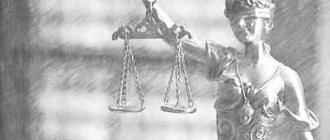Article 45 of the RF IC. Foreclosure of property of spouses
If the debtor - an individual entrepreneur - is or was married, the courts must proceed from the following.
Property acquired by spouses during marriage is their joint property (clause 1 of Article 34 of the Family Code of the Russian Federation; hereinafter referred to as the RF IC). The property of the spouses is common, regardless of which particular spouse it was acquired, registered or accounted for (clause 2 of Article 34 of the RF IC).
In accordance with paragraph 1 of Article 45 of the RF IC, for the obligations of one of the spouses, recovery can only be made on the property of this spouse. If there is insufficient property, the creditor has the right to demand the allocation of the share of the debtor spouse, which would be due to the debtor spouse during the division of the common property of the spouses, in order to foreclose on it.
Thus, the joint property of the spouses cannot be included in the bankruptcy estate. In order to form a bankruptcy estate, the bankruptcy trustee, in the interests of all creditors, may apply to the court with a demand for the division of the common property of the spouses (clause 3 of Article 256 of the Civil Code of the Russian Federation, clause 1 of Article 45 of the RF IC). This requirement is considered in court according to the general rules of jurisdiction.
However, if movable things are in the possession of the debtor, either he is listed as the sole owner of the property right (right of claim, exclusive right, share in the authorized capital of a limited liability company, uncertificated securities, etc.), or in the Unified State Register of Rights to Real Estate and transactions with him reflect that the real estate registered in the name of the debtor is his property, the bankruptcy trustee has the right to assume that the property belongs to the debtor and include it in the bankruptcy estate. In this case, the other spouse, who does not agree with the actions of the bankruptcy trustee, has the right, in the general manner, to apply to the court with a claim for the division of the common property of the spouses and the allocation of property due to the share of this spouse, or to demand recognition of the right of common ownership of the specified property.
If a spouse's claim for division of common property is considered after the sale of property during bankruptcy proceedings, the proceeds from the sale of property are taken into account when determining the shares of the spouses.
Clause 18 of the Resolution of the Plenum of the Supreme Arbitration Court of the Russian Federation dated June 30, 2011 N 51 (as amended on June 6, 2014) “On the consideration of bankruptcy cases of individual entrepreneurs”
The property due to the debtor as a result of the division of the common property of the spouses is subject to inclusion in the bankruptcy estate.
If, as a result of the division of property in kind, one of the spouses must pay compensation to the other in cash, the courts must be guided by the following. If a payment to the bankruptcy estate must be made by the debtor's spouse, then the bankruptcy trustee does not transfer to him the property due to the said spouse as a result of the division until the corresponding amount of money is received by the bankruptcy estate (in relation to Article 359 of the Civil Code of the Russian Federation). If the payment is not made within the period determined by the court considering the bankruptcy case, the bankruptcy trustee has the right to sell the specified property according to the rules established for the sale of property encumbered with a pledge (Article 138 of the Bankruptcy Law), on the basis of Article 360 of the Civil Code of the Russian Federation.
If payment is to be made from the bankruptcy estate, after the sale of property received into the bankruptcy estate as a result of the division of the spouses' community property, the bankruptcy trustee shall pay the spouse the appropriate amount from the proceeds of the sale of said property before the satisfaction of any current obligations or claims of bankruptcy creditors.
The arrest imposed by the arbitration court when placing surveillance on the property of an entrepreneur is aimed at preventing the waste of property that is subject to future inclusion in the bankruptcy estate. In this regard, property owned by an entrepreneur together with his spouse on the right of common ownership is also subject to seizure by virtue of paragraph 1 of Article 207 of the Bankruptcy Law.
The division of this property, as well as the determination of shares in the right of common joint ownership, carried out in court, are the basis for the release from seizure of the allocated property or share in the right of common shared ownership of the common property of the spouse of the entrepreneur in respect of whom the bankruptcy case is being conducted, at the request of such spouse. At the same time, in order to ensure the possibility of reversing execution when the relevant judicial acts are canceled or amended, the court, at the request of persons participating in the bankruptcy case, has the right, simultaneously with the release of property from seizure, to take an interim measure in the form of a ban on the disposal of such property until the completion of the bankruptcy case ( Article 46 of the Bankruptcy Law).
The division of property or determination of shares by agreement of the spouses from the date of introduction of supervision is not allowed.
Clause 19 of the Resolution of the Plenum of the Supreme Arbitration Court of the Russian Federation dated June 30, 2011 N 51 (as amended on June 6, 2014) “On the consideration of bankruptcy cases of individual entrepreneurs”
23. LIABILITY OF SPOUSES FOR OBLIGATIONSProperty belonging to the spouses (common and separate) includes both things and property rights, as well as the obligations of the spouses. Obligations to third parties may arise from contracts (labor or civil law), as a result of causing harm, as a result of unjust enrichment or the commission of a crime, and for various other reasons. The obligations (debts) of spouses can be personal or general. To personal obligations of spouses
include those that are connected by the personality of one of the spouses and arose: before marriage;
during marriage, but in order to satisfy personal needs; due to encumbrance of property received by one of the spouses during marriage as a gift, by inheritance, or other separate property of one of the spouses; due to harm caused by the spouse to other persons; due to a spouse’s failure to fulfill alimony obligations, etc. General obligations of spouses
are obligations that arose at the initiative of both spouses in the interests of the entire family. An obligation aimed at meeting the needs of the family may arise from a legal relationship in which only one of the spouses is the debtor, if the funds received under the obligation are spent in the interests of the family.
General obligations also arise in the event of harm caused to other persons by spouses jointly or by their minor children.
As a general rule, recovery of personal obligations
one of the spouses applies to the property of that spouse. If there is insufficient personal property, the creditor has the right to demand the allocation of the share of the debtor spouse from the mass of the joint property of the spouses in order to foreclose on it. The determination of the share of the debtor spouse and its allocation from the common property is carried out in accordance with Art. 38, 39 SK (under the legal regime of property) or according to the terms of the marriage contract.
For common obligations of spouses, recovery
applies to their common property. Collection may be applied to the common property of the spouses and under the obligation of one of the spouses, if the court establishes the fact of use of the property received under the obligation in the interests of the family. In cases of insufficiency of common property, spouses bear joint liability for common obligations with the property of each of them. In case of joint obligation (liability) of debtors, the creditor has the right to demand performance both from all debtors jointly and from any of them separately. If the property of one of the spouses is not enough, the creditor has the right to demand what was not received from the other spouse. Execution is applied to common property if it was acquired by one of the spouses through criminal means. The property of the spouses may be seized to compensate for the damage caused by their minor children to the life, health and property of other persons (Articles 1073–1075 of the Civil Code).
Table of contents
Bar Association "Legal Defense"
- home
- Articles
- Debt repayment. The practice of collecting from the property of the second spouse
Having concluded a loan agreement, a citizen, along with the obligation to return the received loan amount to the lender on time and in the manner prescribed by the agreement, bears the risk of compensation for losses caused by non-fulfillment or untimely fulfillment of the obligation (clause 1 of Article 393 of the Civil Code of the Russian Federation). Repayment of a debt, as well as the fulfillment of other obligations, according to the general rule of civil law, is carried out at the expense of property owned by a person (Clause 1 of Article 24 of the Civil Code of the Russian Federation). The latter must belong to him by right of ownership, giving the guilty person freedom to dispose of it and thereby fulfill the obligations assumed. By property, at the expense of which a citizen’s debts are compensated, we mean all personal property owned by the debtor, his shares in common shared and joint property (the property of spouses, peasants, farms (Article 255 of the Civil Code)) and other property provided for by law (see Article 80, paragraph 5 of Article 111 of the Civil Code). If you have a problem and need to go to court to repay the debt, then contact us for help. Our phones: (495) 790-54-47. This is confirmed by the fact that in the process of enforcement proceedings the bailiff, in accordance with paragraph 4 of Art. 69 of the Federal Law “On Enforcement Proceedings” forecloses on the debtor’s property, which belongs to him by right of ownership, economic management and (or) operational management. If the debtor has property that belongs to him by right of common ownership, then, by virtue of a reservation made by the legislator, the penalty is applied to the debtor’s share, determined in accordance with federal law. Moreover, paragraph 3 of Art. 256 of the Civil Code of the Russian Federation and clause 1 of Art. 45 of the RF IC directly provides that for the obligations of one of the spouses, recovery can only be applied to the property owned by him, as well as to his share in the common property of the spouses, which would be due to him upon division of this property. Taking into account that, within the meaning of Art. 256 of the Civil Code of the Russian Federation and Art. 34 of the RF IC, property acquired by spouses during marriage is their joint property; repayment of the debt will be somewhat difficult. Difficulties with the execution of a court decision, similar in content, may occur when, in accordance with a marriage contract concluded between spouses, one of the spouses owns all the family property, and the debtor is only the owner of those things, the collection of which cannot be taken under the current legislation. The difficulties of carrying out enforcement actions in this case are manifested largely due to the principle of individual property liability. When making a decision to repay the debt, the judge indicates the specific person responsible for repaying the debt. This person is a party to the enforcement proceedings against whom it was initiated and at the expense of whose property the debt is expected to be repaid. In the case of foreclosure on the joint property of the spouses, as well as on the property of the second of them, the rights of the latter are violated, just as there is a violation of the rights of the claimant in the event of no foreclosure at all. But if, in the case of foreclosure on the joint property of spouses, the current legislation, as well as judicial practice, provides any useful explanations, in particular, the creditor has the right, in accordance with Art. 255 of the Civil Code of the Russian Federation, to present a demand for the allocation of the debtor’s share in the common property for foreclosure on it, then in relation to cases of repayment of the debt at the expense of the property of the second spouse, provided that it is divided on the basis of an agreement between them or a marriage contract while maintaining marital relations, the question remains open. Thus, there is a kind of loophole for unscrupulous borrowers, who can thereby ensure that the debt will not be repaid, i.e. will be able to avoid repaying the loan. In accordance with Part 2 of Art. 45 of the RF IC, foreclosure is applied to the common property of the spouses for the obligations of one of them, if the court establishes that everything received under the obligations of one of the spouses was used for the needs of the family. If this property is insufficient, the spouses bear joint liability for these obligations with the property of each of them. In this case, the creditor, in order to return the debt, has the right to file a claim to foreclose on the property of the second spouse. In support of the stated requirements, the creditor, in accordance with Art. 56 of the Code of Civil Procedure, is obliged to prove that the funds transferred by him to the borrower were spent on the needs of the family. Evidence of the latter, although indirect, can be obtained from the materials of enforcement proceedings. This may in particular include information about purchases made by the family after one of the spouses entered into a loan agreement, for example, a vehicle, household appliances, jewelry made of precious metals and stones, or in the absence of officially confirmed sources of income, other property used in everyday life . The time and circumstances of the conclusion of a marriage contract between spouses can play an important role. For example, the latter took place after the conclusion of the loan agreement. Also, in order to ensure its own interests in the process, the creditor can involve the bailiff service in the process as a third party who does not make independent claims regarding the subject of the dispute. In any case, regardless of the arguments presented to the court for consideration, the last word in the application of the provisions of Part 2 of Art. 45 of the RF IC remains with the court. Do you need a good lawyer? Our lawyers will help you repay the debtor. Call: (495) 790-54-47. Petrov Mikhail Igorevich © IOO “Legal Protection”






